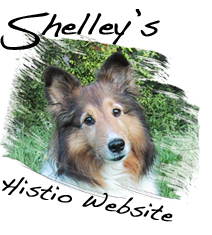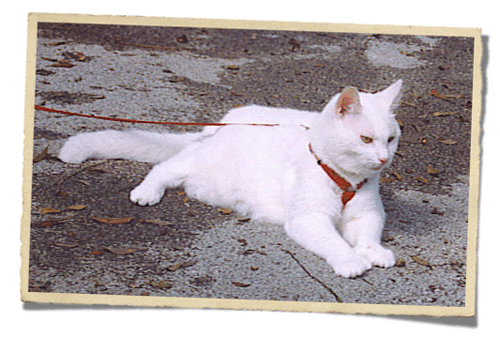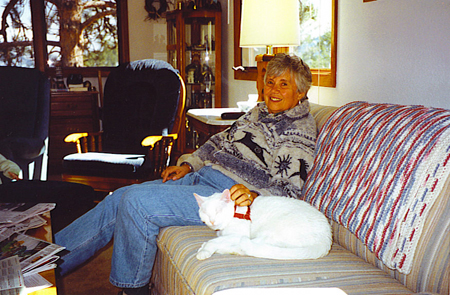
HOME
 YOUR HISTIO STORY
YOUR HISTIO STORY
I am looking for similarities
in all individual cases of
Histiocytic diseases.
I wonder if we all tell our
stories we might come up
with some commonality
between the specific
situations in which all of
our pets got this disease.
So please email me the
details and I'll put your
pets story on Shelley's
Histio Website
 UW HISTIO VERHAAL
UW HISTIO VERHAAL
Ik ben op zoek naar
overeenkomsten in alle
individuele gevallen van
Histiocytose.
Ik hoop dat wanneer wij
onze Histio verhalen
vertellen, wij overeen-
komsten ontdekken over
de manier waarop onze
huisdieren deze ziekte
hebben opgelopen.
Stuur mij de details en
ik zal het verhaal van uw
huisdier op de Histio
website van Shelley zetten.
 WARNING !
WARNING !
These stories are all
different. Individual
symptoms, situations
and circumstances
may vary and response to
therapy is not always the
same.
- Disclaimer -
 WAARSCHUWING !
WAARSCHUWING !
Deze verhalen zijn allemaal
verschillend. Individuele
symptomen, situaties en
omstandigheden kunnen
verschillen en de reactie
op therapie is niet altijd
hetzelfde.
- Disclaimer -
HISTIOCYTOSIS IN
OTHER LANGUAGES
German - Hund
Maligner Histiozytose
French - Chien
l'Histiocytose Maligne
Italian - Canis
Maligni Histiocytosis
Spanish - Perros
Histiocitosis Maligna
Dutch - Hond
Maligne Histiocytose
HOME
Alexander
Malignant Histiocytosis
- My Great White Cat -
Male


In the fall of 1996 my Persian cat had been dead for a year and I was ready for a new cat. One day I just happened to catch a local show filmed at the animal shelter in Norwalk, CT where they showcased animals up for adoption. A woman came on holding up an enormous, six -year old white cat that was deaf and had an extra toe on each front foot. He was quite feisty and seemed to be unfazed by his ordeal. While many of the other cats looked pathetic, he seemed to have an unflappable personality. My daughter and I called the shelter and went right over to get him. When we got there, one couple was ahead of us. However, because they could not agree on the cat, (the wife didn't want him, the husband did) the cat went to us.
From then on Alexander was an important member of my family. He took to sleeping at the foot of my bed and made a good adjustment to his new home A year later, he was diagnosed as having congestive heart disease and then with allergies that required prednisone. However, he did well on all his medications for five years. He weighed nearly twenty pounds and was never a very active cat. He loved to snooze and eat. Because of his deafness he didn't fear traveling in the car as he never heard road noises. As he got older he became more affectionate and took to sitting on my lap for longer periods, especially if my grandson was over and was sitting in my lap. He was quite jealous of his territory!
In 1998, I retired from teaching and off we went! I bought a Scamp trailer and Alex and I traveled successfully to Big Bend National Park in Texas where he was nearly eaten by javelinas when he escaped from the Scamp one night. We went on to Arizona where we parked in my sister's back yard for two weeks, and then to California, visiting friends and relatives along the way. Home after three months on the road after visiting old friends in Estes Park, CO and driving in snow through Nebraska to Chicago. Alex was happy walking the campgrounds in his red harness and leash. He attracted attention and I met many interesting people through Alex.
 The next two winters we went to Florida and stayed in the Everglades National Park and the Great Cypress Swamp. This past year saw us camped in the Ocala National Forest where Alex made many friends among the campers there. However, he developed a lump on his paw and when I got to Ft. Myers, the vet there recommended a biopsy. So the 1st of March we headed home. The biopsy proved to be negative for cancer but the vet was concerned about a swollen lymph node in his neck. He underwent antibiotic treatment for two weeks, which did not affect the swelling. The vet then suggested he biopsy the lymph node and remove it which he did. A week later, he called to say that Alex had Malignant Histiocytosis, an incurable cancer that was very lethal and that Alex didn't have more than a few months to live if that. There was no effective treatment and all I could do was make him as comfortable as possible and keep him eating as long as I could.
The next two winters we went to Florida and stayed in the Everglades National Park and the Great Cypress Swamp. This past year saw us camped in the Ocala National Forest where Alex made many friends among the campers there. However, he developed a lump on his paw and when I got to Ft. Myers, the vet there recommended a biopsy. So the 1st of March we headed home. The biopsy proved to be negative for cancer but the vet was concerned about a swollen lymph node in his neck. He underwent antibiotic treatment for two weeks, which did not affect the swelling. The vet then suggested he biopsy the lymph node and remove it which he did. A week later, he called to say that Alex had Malignant Histiocytosis, an incurable cancer that was very lethal and that Alex didn't have more than a few months to live if that. There was no effective treatment and all I could do was make him as comfortable as possible and keep him eating as long as I could.
This news was a terrible shock. While Alex was 14 years old and had some health problems, I hadn't planned on losing him so soon! My buddy and traveling companion had come to be an integral part of my life and daily routine. He was a happy camper and I loved him for his faithful connection to me. On the other hand, I did not want him to suffer unnecessarily from this disease. So the waiting for the disease to take effect began. At first, Alex just seemed to sleep more than usual. He lost weight and began eating less. From the diagnosis around the beginning of April to his death on May 25th he lasted not quite two months. I went out only to do my shopping or have dinner at my daughter's house occasionally. I was afraid if I went out he might die or be in distress while I was gone. He slept at night with his head on my pillow right next to me. He sat in my lap during the day or next to me on the couch. He seemed to know his time was limited. He purred right up to the end and had enough strength to jump up on the bed. But what was disturbing was that about May 15th he stopped eating completely. Nothing I could do to tempt him to eat (baby food, heating food in the microwave, feeding him with a syringe) worked. His eyes turned yellow and he started sleeping on the couch in the den with his face to the wall. I knew the time was coming and called my vet who was away on vacation. He had promised to put Alex to sleep at home when the time came. That weekend I tried to locate a vet who would make house calls but when she had not returned my call on Monday morning I took Alex in to my vet's office wrapped in a towel. He was too thin and weak to protest. He didn't care where he was and the stand-in vet put him to sleep in my arms. My daughter had driven me to the vet's and we took Alex home in a cardboard box and buried him in the garden right outside my bedroom window. We planted a white rose bush over him as well as some iris and some lilies of the valley. We call it Alex's garden, My grandson who is six came and threw some earth in with some flowers when we said good-bye to Alex.
The house has seemed empty and lonely without Alex. He has been mourned for and missed. In August, my second daughter moved into a place that did not allow cats and asked me to take her Maine Coon cat, Julie. So life goes on and a new cat has come into my life. However, Alex with his adventurous spirit and faithful friendship will never be replaced in my heart.
Story told by Mary Ellen G.

